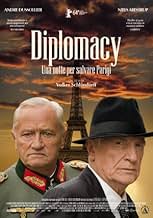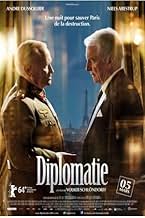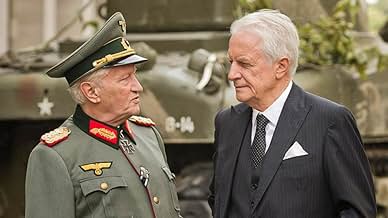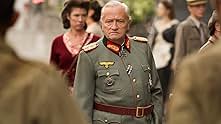Ajouter une intrigue dans votre langueA historical drama that depicts the relationship between Dietrich von Choltitz, the German military governor of occupied Paris, and Swedish consul-general Raoul Nordling.A historical drama that depicts the relationship between Dietrich von Choltitz, the German military governor of occupied Paris, and Swedish consul-general Raoul Nordling.A historical drama that depicts the relationship between Dietrich von Choltitz, the German military governor of occupied Paris, and Swedish consul-general Raoul Nordling.
- Prix
- 5 victoires et 6 nominations au total
- Opérateur radio
- (as Pierre-Marie Rochefort)
Avis en vedette
That actually comes up in this film, "Diplomatie," from 2014, based on a play. It's basically a two-person movie about the conversation Swedish consulate Raoul Nordling (André Dussollier) has with Général von Choltitz (Niels Arestrup).
Germany has basically lost the war; the Allies are en route to Germany, and Hitler has decided to make Paris scorched earth, killing millions and razing the city to rubble. There was no strategic reason to do this. He was just feeling especially spiteful that day and figuring, why leave the Allies with this jewel.
Nordling, a Paris resident, comes to ask von Choltitz to spare Paris. Von Choltitz has never defied an order, no matter how he felt about it, and he is very dismissive of Nordling. He points out that there's practically nothing left of Hamburg - did those civilians not matter?
He tells Nordling that the Parisians gave the Nazis Paris "with their legs open - like whores. We can do what we want with it." They go back and forth on this, and von Choltitz later admits that Hitler has gone off the rails. But there's nothing he can do - his family will pay the price if he doesn't do as he's told.
This is an excellent film with superb acting by both men. The most chilling scene takes place in the beginning, when von Choltitz and soldiers go over the plan to destroy Paris. It's absolutely shocking. They go through every landmark, every famous street, discussing how it will be taken down, how the city will be flooded when they break through the river barriers. It's awful.
I knew right away that Neils Arestup was not German - I could understand every word he said. When real Germans speak, I can't. He does a masterful job, so aggressive and cold in the beginning, and then gradually weakening. André Dussollier, with his quiet performance, is excellent in his persuasiveness.
I believe the mayor of Paris and Nordling both visited von Choltitz.
Well, we all know what happened. Here in the U. S., I think sometimes World War II has been glamorized a bit as it was not fought on our soil.
For many of our fathers, it was their first time away from home and their normal lives. In reminiscing, for an 18-year-old who maybe went over at the end of the war, it was an adventure and the beginning of lifelong friendships. Sadly the outcome was not the same for all.
World War II was filthy, it wasn't the propaganda movies trying to keep our spirits up. It was a horrible war that killed many people through bombing, extermination, and starvation. For much of Europe, the aftermath wasn't that much better.
"Diplomate" is just a microcosm of one man's efforts to stop the carnage. Definitely worth seeing.
Masterfully set in the tense historical and ideally theatrical moment, the story demonstrated that the combination of the power of the iron will and the eloquent linguistic skills, both built on the trust of the two human beings, was able to defy something impossible.
From the linguistic point of view, the film was made very realistic, switching between German and French. This is a relief, given a flood of supposedly European movies of recent with a way too many English speaking characters.
I want my children to watch this film to eyewitness the history and perhaps something more important than that: Words, not the sword, saved Paris and her people from calamity.
The relationship between the characters of von Choltitz, Governor-General of occupied Paris and Swedish consul Nordling had been touched upon in René Clément's sprawling and star-studded epic 'Is Paris burning?' in which they were played by Gert Frobe and Orson Welles. They met on several occasions but for the dramatic purposes of the play Gély depicts one fictional meeting that takes place in the L'Hotel Meurice on the Rue de Rivoli just hours before von Choltitz is due to carry out Hitler's order to destroy Paris rather than let it to fall into the hands of the advancing Allies.
Here, as opposed to the earlier film, the emphasis is on individual rather than collective action. The means by which Nordling allegedly convinces the hard-nosed and brutal General to rescind Hitler's maniacal order are of course purely hypothetical but results in excellent theatre. Presumably Gély had access to the General's memoirs but how reliable are these one wonders? There are some who have suggested that von Choltitz is merely motivated by the desire to save his own skin, knowing that his previous military actions in Rotterdam and Sevastopol would mark him out as a war criminal(in fact he only served two years in prison) and that anyway, he lacked sufficient time and resources to carry out the order effectively. What is plausible and very much in keeping with the characters is that Nordling promises to get von Choltitz' wife and children out of Germany and into safety in Switzerland if he surrenders the city. It is known than Choltitz had previously refused to obey Himmler's order to ransack the Louvre so already the seeds of defiance were being sewn and like so many officers of the Wehrmacht he had serious doubts about Hitler's sanity. Perhaps after all Nordling wasn't required to do too much persuading.
As for the film Volker Schloendorff has done a marvellous job in sustaining our interest in what is essentially a two-hander. The camerawork of Michel Amathieu is excellent and although shot in colour the contrasts between light and dark aid the drama immeasurably. The director mainly keeps the action within the proscenium arch but a filmically effective scene is where von Choltitz rescinds the order whilst on the roof of the hotel so that both he and the audience have the panorama of Paris in view.
Schloendorff has achieved a perfect balance here between film and filmed theatre and has the advantage in Arestrup and Dusollier of two consummate professionals at the top of their game.
Seventy-five years on it is difficult to appreciate just how close Paris came to destruction. One would dearly love to believe that Nordling's arguments won the day as it gives us a feeling that maybe, just maybe, 'the strength of one in tongue and speech is mightier than all fighting.' We live in hopes!
The play-turned-movie is the story of the general in charge of the Nazi Occupation of Paris, and the Swedish diplomat who has a passing relationship with the man when the play begins. All of Paris' great architectural treasures are to be destroyed to buy time for the retreat of the Nazi army across France, and it's only a matter of hours before the order is given. The Swedish diplomat in his powerful and sly persuasive style takes on the general in trying to dissuade him through some of the most artful, intelligent and brilliant rhetoric I've seen in a movie. In many ways the film feels like a boxing match, a final scene in a Rocky movie between an underdog boxer and his strong but weary opponent who seemingly has no weaknesses.
There is both the German and French culture's strengths and weaknesses on display (even though the diplomat represents Sweden he openly says that Paris has embraced her and she him). I love this sort of contrast, particularly in showing that Germans have a softer side that's deep and valuable to them, and the French have a gristly fighting spirit that was formidable and feared up to this day; unfortunate stereotypes for both cultures. I read a quora article today about how the French didn't flee the Germans, they fought but in the WWI style that was ineffective against the Blitzkrieg (now adopted by all modern militaries in the world today). We also forget the British lost to the Germans shortly afterward, and were driven back to their island.
The movie feels like a play, which I would somewhat fault it for in some ways, but it doesn't become a distraction or take away from the film. Also the movie seems small at times, with 90% of the dialog happening in one room in a hotel where the Nazi general works. Granted, this is likely due to the low budget and it does help the motif of the movie being about the power these two men have over the fate of Paris.
This movie falls in line with a string of films lately that could almost make a genre itself: the artist/culturally sensitive figure fighting to preserve and save artistic treasures amidst a raging battle. "Monuments Men" and "The Train" come to mind immediately.
I can't help but think of all the destruction caused by wars, the Abbey at Monte Cassino being one, as well as several that we're seeing in the Middle East. I remember reading about how many important buildings and museums were threatened and attempted to be preserved as the US army went through Iraq.
Historical treasures that are destroyed by war is one of the greatest arguments against it, its chaos and disregard for what's most valuable in the world. A broader theme though is the value of an entire culture and its history, and how often war and strife easily take those down, possibly because they're so prominent and essential to a city's character. Coming from a country like the US, I don't have as acute a sense of this as those who live in Europe, but there is still something in humanity in which we are drawn to monumental art, and value it as more than just a tourist site. Paris is an easy example of this.
The movie is worth seeing, and it's quaint in its setting, and beams a sense of humility which is refreshing when movies in our time seem to fight to be the biggest (though the consequences of the decisions made in the movie are massive). It's where live theater has something to offer the world of movies, a kind of depth through being as small as possible.
Le saviez-vous
- Citations
Général von Choltitz: Do you know what we do to men like you?
Raoul Nordling: Give them a medal?
Général von Choltitz: [breaking a smile] Yes, on occasion.
[stern again]
Général von Choltitz: Posthumously.
- ConnexionsFeatured in Diplomatie: Making of (2015)
- Bandes originalesLa 7ème symphonie
Music by Ludwig van Beethoven (as Beethoven)
Conducted by Wilhelm Furtwängler
Berlin 1943 © Société Wilhelm Furtwängler
Performed by Berliner Philharmoniker (uncredited)
Meilleurs choix
Détails
- Date de sortie
- Pays d’origine
- Site officiel
- Langues
- Aussi connu sous le nom de
- Diplomacy
- Lieux de tournage
- Jardin des Tuileries, Paris 1, Paris, France(city park in front of the hotel)
- sociétés de production
- Consultez plus de crédits d'entreprise sur IMDbPro
Box-office
- Brut – États-Unis et Canada
- 230 880 $ US
- Fin de semaine d'ouverture – États-Unis et Canada
- 8 518 $ US
- 19 oct. 2014
- Brut – à l'échelle mondiale
- 4 207 242 $ US
- Durée
- 1h 24m(84 min)
- Couleur
- Mixage
- Rapport de forme
- 2.35 : 1




























